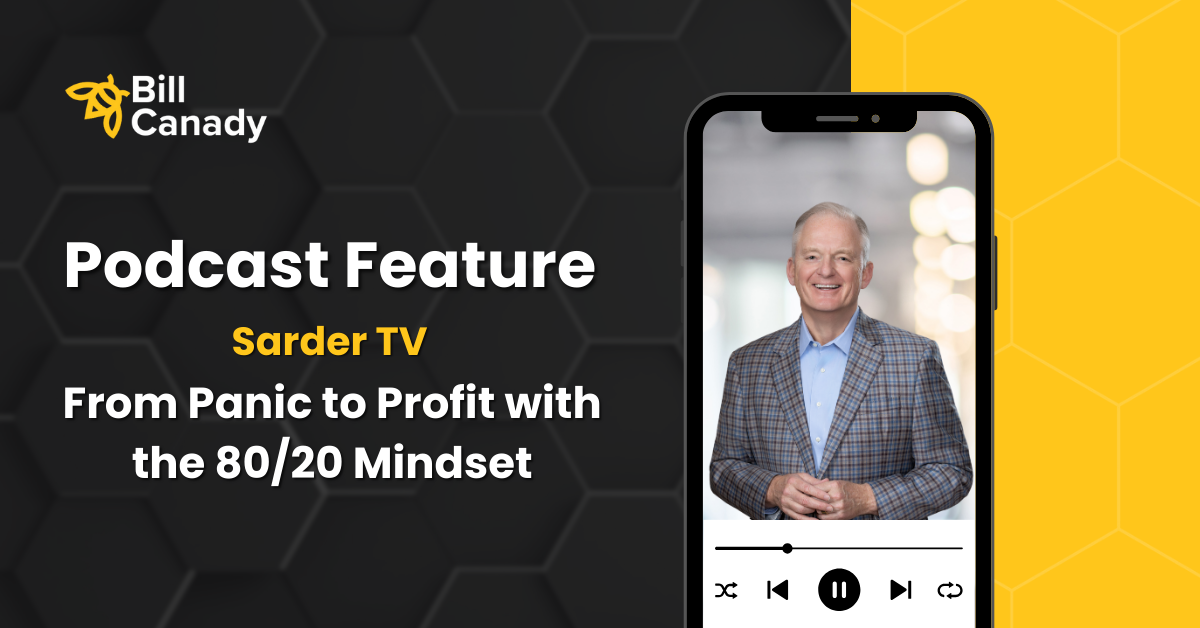How I Turn Panic Into Profit with the 80/20 Mindset
by Bill Canady in Blog, Podcast
November 4, 2025

I joined Vaishali Jain for an interview on SarderTV, where we explored how the 80/20 Principle shapes my approach to leadership, profitable growth, and building organizations that scale with discipline and clarity.
How the 80/20 Principle Transforms Leadership and Growth
For more than three decades, I have had the privilege of leading companies through nearly every business condition imaginable, from boom years to economic shocks, from startups to global industrial organizations. Along the way, one simple truth has stood out: growth is not a right, it is something you earn.
When I wrote From Panic to Profit, my goal was not to create another management book. I wanted to share a system that I call the Profitable Growth Operating System, built on real-world results, data, and experience. This framework helps leaders navigate uncertainty, turn chaos into clarity, and unlock growth that lasts.
The Power of Focus: Understanding the 80/20 Rule
The foundation of my approach is the 80/20 Principle, first observed by the Italian economist Vilfredo Pareto more than a century ago. He discovered that 80 percent of the land in Italy was owned by 20 percent of the people, and that this imbalance appears almost everywhere.
In business, it means that 20 percent of your customers, products, or efforts drive 80 percent of your results. Yet most companies spend their energy chasing the wrong 80 percent.
When I step into a company, I start by looking at data, not opinions or politics. We find where value is truly created and shift our people, capital, and attention there. It requires courage to stop doing what does not work, but it is the only way to achieve consistent and profitable growth.
The Zero-Up Experiment
One of my favorite exercises is what I call Zero-Up Thinking.
Imagine starting from zero with a blank sheet of paper and asking:
If I had to build this business again from scratch, with the same resources, where would I invest first?
Most leaders realize they would start with their best customers and products, the ones that generate most of the profit. They would make sure those relationships are strong before doing anything else.
This mindset helps teams stop clinging to legacy projects or unprofitable distractions. It forces focus and discipline, two qualities that separate companies that merely survive from those that truly scale.
The Three Leaders Every Company Needs
Every successful organization needs three types of leaders:
- The Visionary – the strategist who defines where the company is going and why it matters.
- The Operator – the builder who turns vision into execution and keeps the business running day to day.
- The Prophet – the teacher or expert who brings in specialized knowledge to accelerate transformation.
Great companies balance these roles. The visionary sets direction, the operator delivers performance, and the prophet ensures that learning becomes part of the culture. When any of these roles is missing, growth slows or stalls.
Lessons from the Navy: Discipline and Resilience
Before business school and boardrooms, I served in the U.S. Navy. I will admit that at 18 years old, I hated every minute of it. But looking back, it was one of the most important experiences of my life.
The Navy taught me discipline, teamwork, and resilience. It taught me to finish what I start, pay attention to details, and treat people with respect. Those lessons have guided every leadership decision I have made since.
No matter how tough the day or how complex the challenge, I still go back to that mindset: do your duty, take care of your people, and finish the mission.
Data, Not Drama
I often say: be data-driven, but do not wait for perfection. If you have less than 20 percent of the information, you are guessing. If you wait until you have 80 percent, you have waited too long.
Leaders must make decisions in ambiguity. The goal is not to be right all the time but to act, learn, and adjust quickly. Waiting for every piece of data before moving paralyzes progress.
At OTC Industrial, one of the companies I helped lead during the pandemic, we faced pricing pressure, cash challenges, and an unmotivated workforce. Instead of waiting for perfect clarity, we gathered just enough insight to act. We built a pricing team, took control of cash flow, and re-engaged our people. Within months, results turned around.
Culture Eats Strategy (and Then Some)
You can have the best strategy in the world, but without the right culture it will not work.
I have seen too many organizations treat change initiatives as short-term experiments. Real transformation happens when people feel safe to try, fail, and improve together.
A winning culture is not built on fear or punishment. It is built on forgiveness, accountability, and progress over perfection. Encourage your team to lift each other up, not tear each other down. When that happens, data and strategy come alive.
The Rise of AI and Why It Is a Gift to Leaders
Artificial Intelligence is not the enemy of leadership. It is an amplifier.
At my companies, we have integrated AI to analyze millions of data points that used to take humans weeks to process. AI handles the heavy lifting, freeing leaders to focus on insights, creativity, and strategy.
But here is the key: AI is only as smart as the human leading it. Garbage in means garbage out. The real brilliance still lies in human judgment, in asking the right questions and knowing what to do with the answers.
Earning the Right to Grow
Before chasing growth, ask yourself:
- Are we serving our customers with excellence?
- Are our people equipped and aligned?
- Is our foundation solid?
Growth amplifies whatever already exists, good or bad. Companies that scale dysfunction collapse faster. Those that strengthen their core can grow sustainably.
Final Thought
If there is one message I hope leaders take from From Panic to Profit, it is this: clarity beats complexity.
Get the basics right. Focus on your top 20 percent. Build a culture that learns, forgives, and executes. And remember, leadership is not about knowing everything. It is about setting the vision, empowering others, and having the courage to act when things are uncertain.
That is how you move from panic to profit and from good to truly great.
Vishali
[00:00]
Welcome to Sarder TV, an idea-sharing platform founded by Russell Sarder, who’s an author, investor, and the CEO of Netcom Learning and AIerts. Today, we’re joined by Bill Canady, a seasoned CEO and business leader with over 30 years of experience in driving growth across global organizations. He’s the author of From Panic to Profit — a practical guide that shows leaders how to use systems thinking to unlock real, sustainable growth. Bill, thank you so much for joining us today. It’s great to have you here.
Bill Canady
[00:35]
Listen, it’s an honor to be here, Vishali. It’s just such a pleasure to be with you today.
Vishali
[00:45]
Thank you. You have over 30 years of experience as a CEO and business leader driving growth across organizations. Tell us a little bit about your background.
Bill Canady
[00:55]
Yeah, it’s interesting. I started out 30 years ago and went into the Navy after high school. After that, I got a job as a sales guy and worked my way up from there. The company I was with went through an acquisition, which got me hooked on both leadership and doing deals. I went back, got my MBA at the University of Chicago, and started leading companies. For the past 15–20 years, I’ve been CEO of different companies, and it’s been a real honor.
Vishali
[02:00]
You wrote From Panic to Profit. What inspired you to write this book, and why now?
Bill Canady
[02:20]
I had written my first book, The 80/20 CEO, which was an overview of the program we put in place. But looking at where we are today, I felt we needed something practical to help leaders manage uncertainty and growth.
Vishali
[03:20]
Your book outlines the Profitable Growth Operating System, driven by the 80/20 principle. Can you briefly walk us through it?
Bill Canady
[03:40]
Sure. The system is simple: focus on what works, stop what doesn’t. Analyze company data, identify top customers and products, and shift resources to those key areas.
Vishali
[04:40]
What makes your model different from other growth frameworks?
Bill Canady
[05:00]
Three things: it’s fact-based, has no surprises, and focuses on results. When you organize around data, performance improves.
Vishali
[06:00]
You mention that companies must earn the right to grow. What does that mean in practice?
Bill Canady
[06:20]
It means fixing foundational issues before scaling. Ensure quality, systems, and service are strong before growing.
Vishali
[07:20]
What are signs a company focuses on the wrong 80%?
Bill Canady
[07:40]
They spend time and money on unprofitable customers or products. The 80/20 rule shows that 20% of effort drives 80% of results.
Vishali
[08:40]
You also discuss the 'Zero-Up' thought experiment. What is that?
Bill Canady
[09:00]
Start from zero, focus resources on your best customers and products — the ones generating 80% of profits. Reallocate accordingly.
Vishali
[10:00]
Your book guides leaders to pivot from panic to confidence in 100 days. What are the common traps?
Bill Canady
[10:20]
Leaders wait for perfect data. Act when you have enough insight — align your team and move forward confidently.
Vishali
[11:20]
Can you share an example of a company that implemented your system?
Bill Canady
[11:40]
At OTC Industrial during the pandemic, we faced pricing, cash, and people challenges. Using data, we built focus teams and turned results around quickly.
Vishali
[12:40]
How do leaders balance cutting complexity while fostering innovation?
Bill Canady
[13:00]
Prioritize. Focus your team on the most important initiatives based on data. Better one great success than ten unfinished ones.
Vishali
[14:00]
You mention every company needs three types of leaders. Can you explain?
Bill Canady
[14:20]
Visionary (CEO), Operator (execution), and Prophet (expert). Each brings unique strengths to drive growth together.
Vishali
[15:20]
What lessons from your Navy experience still shape your leadership?
Bill Canady
[15:40]
Discipline, attention to detail, and resilience. The Navy taught me to finish what I start and respect people.
Vishali
[16:40]
You’ve led companies with thousands of employees. How do you keep strategy grounded?
Bill Canady
[17:00]
Overcommunicate vision and culture. Whether 10 or 10,000 employees, repetition ensures alignment.
Vishali
[18:00]
What role does company culture play in executing your system?
Bill Canady
[18:20]
Culture defines success. You need forgiveness, collaboration, and support, not fear to make growth work.
Vishali
[19:20]
How do you see AI impacting the 80/20 principle and your framework?
Bill Canady
[19:40]
AI automates data analysis, freeing leaders for strategic thinking. It’s a force multiplier, not a replacement.
Vishali
[21:00]
What do you do when your organization faces pressure or change?
Bill Canady
[21:20]
Pause, stay calm, communicate openly, focus on facts, and trust your team. Results come from teamwork.
Vishali
[22:40]
If a leader could take one action after reading your book, what should it be?
Bill Canady
[23:00]
Align your team. Ask everyone about the company goal — you’ll find many different answers. Get everyone on the same page.
Vishali
[24:00]
Great insights, Bill. Thank you for joining us today.
Bill Canady
[24:15]
Thank you, Vishali. I really enjoyed it.
Vishali
[24:25]
And we’ll see you next time on Sarder TV.
